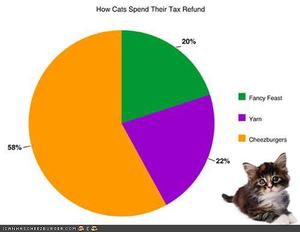
Adopt These 9 Money Habits to Increase Your Net Worth
One way to reinforce habits is to celebrate small wins. If you eat slightly less junk food or exercise a bit more, you can count it as an accomplishment. The positive reinforcement helps to make us feel better, inspire confidence and slowly build habits that makes reaching our goals a bit easier. This is particularly true with financial discipline. It is important to recognize that, like any habit, it is a process that takes time. The good news is that there are tangible metrics to measure your success e.g. when you have more in your investment accounts or a higher net worth.

What is a notice of assessment and How to Handle a request for information
After you file your income tax return Revenue Canada (CRA) and Revenue Quebec (RQ) will send you an acknowledgement (somewhat like a report card) that the return has been received and a detailed breakdown of the tax return that was filed including any discrepancies. It also provides some information pertaining to future years such as limits and carryforwards. The NOA is also referred to as an “avis de cotisation” if your preferred language is French or when you receive one from RQ. Some of the information that can be found on a notice of assessment includes:

How to Reflect Investment Income and Capital Gains/Losses on your Personal Tax Return
Residents of Canada are required to reflect all sources of worldwide income on their personal tax returns. For most individuals, who have investments with Canadian based banks and brokerages, this is fairly straightforward as you will receive the relevant tax slips, usually by March 31st of the year following the end of the calendar year i.e. for the 2023 tax year, you should receive all investment related tax forms and slips by March 31st, 2024. It is important, if you have investment income in non registered investments (i.e. not TFSA, RRSPs or FHSAs), to ensure that you have received all tax documents and report them. Failure to report income can result in penalties by Revenue Canada and Revenue Quebec, which is never great, particularly when it can be easily avoided. It should be noted that since most tax documentation is submitted by the issuer to Revenue Canada (CRA) and Revenue Quebec (RQ) electronically, they usually have a record of the various types of investment income for each taxpayer and can easily identify any missing information.

Make Your Taxes Easier with this Detailed Checklist
The deadline to file tax returns is quickly approaching, resulting in various degrees anxiety for some taxpayers and accountants. The good news is that the stress can be managed fairly easily with some simple organization techniques. The most effective starting point is to evaluate your tax situation and prepare a checklist of the documentation that you will need with respect to your specific tax situation. A checklist can help to ensure that important items are not overlooked in the rush to put everything together (and, of course, its always satisfying to cross something off the list).

Two (and a Half) Options for Claiming Employee Home Office Expenses in 2020
As numerous employees shifted from their offices to their homes, Revenue Canada (CRA) and accountants were deluged with questions about how they could claim home office expenses. To stave off the complaints and questions, CRA decided to introduce a simplified method of claiming a tax deduction. It should be noted that employees have always been allowed to claim expenses relating to their employment as long as their employers completed and signed form T2200. The information from this form would then be entered on Schedule T777. The issue for this year is that filling out the form and completing the schedule is a somewhat tedious process and does not fit all employees’ who worked from home as a result of Covid imposed restrictions.

7 Lesser Know Facts About RRSPs
It is the time of year when everyone adult Canadian should be thinking about investing into their registered retirement savings plan (RRSP) prior to the deadline of March 1st. Many of you might think that you are young and have time or conversely that you are older and it’s too late. The truth is that it is never too early or late to start a RRSP. You simply need to set a goal and start doing it.
The great benefit of investing in RRSPs, which is the single best tax optimization strategy available to all Canadians, is that it reduces the amount of income taxes that you will have to pay. The tax savings is based on your marginal tax rate. Since everyone’s income is allocated to different tax brackets as your income increases, the marginal tax rate represents the highest tax bracket which applies to the top portion of your income.

Why Every Canadian Should File a Personal Tax Return
A friend of mine has been in a nightmare scenario with CRA. She hadn’t filed her tax return in a few years mostly because she had one T4, figured that she didn’t owe any tax and was simply procrastinating on an unenjoyable task. In 2020 she receive a notice of assessment from CRA indicating that she owed several thousand dollars, with no additional details except that they had added $25k to her actual income earned. Over the past year, she has called them numerous times to get an explanation and each time she is told that the file is being escalated and someone will get back to her. To date nobody has gotten back to her. To make matters worse, CRA passed this information i.e. additional income on to Revenue Quebec (without any details) which resulted in a significant assessment from them. She still has no idea why she was assessed this amount and is now in the unenviable position of calling both revenue agencies on a weekly basis to manage the situation.

Tax Deductions vs Tax Credits and 5 Tax Deductions to Help Reduce Your Tax Bill
Most taxpayers use the terms tax deduction and tax credit interchangeably. Since they are not accountants, this is perfectly fine unless you are particular about precision and strive for a greater understanding of tax. And while there a numerous technicalities and jargon in tax that are better left to tax professionals, this particular distinction is fairly straightforward , can useful to understand and might even save you some tax.
So, what is the difference? A tax deduction is a reduction of your net income on which your taxes payable are based, while a tax credit is a direct reduction of your taxes payable. These might sound very similar, but their impact on how much tax you pay is different. Since there are different tax brackets, a tax deduction results in a reduction of your taxes payable effectively at the highest tax bracket to which your income applies, while a tax credit (for simplicity we are only talking about the federal portion and not provincial) will only reduce your taxes by 15%, which corresponds to the lowest tax bracket. While this can get significantly more complicated, suffice it to say, if your income exceeds approximately $50k, tax deductions have a higher value i.e. they reduce your taxes by a greater amount than a tax credit since part of the $50k will be taxed based on a higher tax bracket.

Tax Return Checklist for Individuals and Unincorporated Business Owners
The deadline to file tax returns is starting to loom large, resulting in anxiety for some individuals and small business owners. The good news is that the stress can be managed fairly easily with some simple organization techniques. The best starting point is to evaluate your tax situation and prepare a checklist of all the documentation that you will need with respect to your specific tax situation. A checklist can help reduce (or eliminate) important items that might get forgotten in the rush to put everything together (and its always satisfying to cross something off the list). I have compiled a list of some of the more common income, deductions and credits that the majority of taxpayers are likely to have:

What is your Net Worth?
There comes a point in many people's lives when they want to find out what they are worth. This is much more difficult to quantify on a metaphysical level; however on a tangible level most people can figure out how much wealth they have created over time. The definition of net worth is simply the total of all your assets (what you own) less your liabilities (what you owe).

Consider These Financial and Tax Implications When Buying a Home
The Canadian real estate market has been a good place to invest in recent years, although comparisons to the US real estate bubble, which finally culminated in 2008, are continuing to intensify. Potential homeowners often find themselves seduced by their vision of the perfect home in the perfect neighbourhood and end up in a difficult situation, referred to as “house poor”, where the majority of their disposable income goes to paying down their mortgages. This can be avoided by ensuring that you realistically assess what you can afford and being financially responsible.

9 Tax Facts about Charitable Donations for Individuals and Small Business Owners
Every good act is charity. A man's true wealth hereafter is the good that he does in this world to his fellows. - Moliere. Unfortunately, the Canada Revenue Agency (CRA) has specific criteria for what qualifies as a charitable donation and not all good acts qualify for a tax benefit. Growing a moustache (although not without its costs) or running a marathon, are generally not considered to be a charitable donations according to the tax code. Luckily there are a multitude of charitable organizations that do qualify the donors to receive a tax credit for their donations. Some facts about the tax credit are discussed below:

Understanding Payroll Deductions: Personal Income Tax Rates, CPP/QPP, EI and Basic Exemption
The automation of the tax preparation and filing process has been a boon to individuals and tax preparers alike. Gone are the days of struggling to find the right box on the return, adding everything up 5 times and still getting different results, and hoping that the CRA can read your chicken scrawl. Present day tax software not only guides you through every step of the process, it also helps to optimize your allocations thereby reducing your taxes payable. There is however at least one downside to automation: Since we are more removed from the actual calculations, our understanding of our tax situation is somewhat diminished. We have an idea of what we expect to pay, which we can see every week on our paycheques (or for self employed individuals, the breathtaking moment when we see the final result on our tax return), but often we are not really sure how these amounts are derived. Below is a discussion of the tax rates, deductions and maximums to improve our comprehension of this somewhat complex topic:
9 Psychological Traits that Affect Our Investing and Business Decisions

Modern portfolio theory assumes that we are rational investors and invest only in efficient and optimal portfolios that provide the maximum return for minimum risk. The truth (as posited by Behavioural Economists) is that we far from rational and are subject to a myriad of psychological influences and behaviours that prevent us from not only making optimal investment or business decisions, but can in some cases turn us into morons. We buy and hold too long or buy and sell too quickly; we refuse to accept losses assuming that we will recover our money or we sell losing investments way too soon; we are overconfident about our own abilities or place too much trust in “experts”; we maintain the status quo and do nothing or we change things too frequently. The dichotomies of investing behaviour are numerous and fascinating and have lead to creation of field of study referred to as Behavioural Ecomomics. Each of these behaviours also has a tremendous impact on our business decisions and are discussed below:
5 Income Tax Tips from the Trenches
It is the time of year when many accountants and tax preparers live, breathe, eat and sleep taxes (leaving very little time to write about them!). And while much of it is routine, there are numerous issues that arise, the treatment for which is not immediately apparent and can actually be quite interesting (perhaps more so to a tax nerd), some of which are compiled below:
